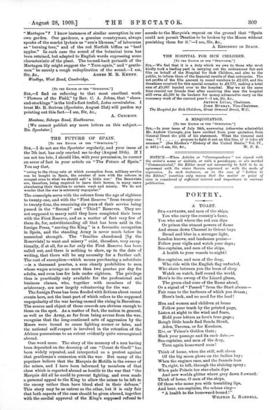THE FUTURE OF SPAIN.
[To THE EDITOR OF THE " SPBCTATOR.1 SIR,—I do not see the Spectator regularly, and your issue of the 7th inst. has only reached me to-day (August 19th). If I am not too late, I should like, with your permission, to correct an error of fact in your article on "The Future of Spain." You say that, "owing to the cheap rate at which exemption from military service can be bought in Spain, the number of men with the colours is unequal even to what we should sail a little war.' The Reservists are, therefore, being required to leave their homes, in many oases abandoning their families to certain want and misery. We "do not wonder that the war is extremely unpopular."
The conscripts serve with the colours from the age of eighteen to twenty-one, and with the "First Reserve "from twenty-one to twenty-four, the remaining six years of their service being passed in the "Second" and "Third" Reserves. They are not supposed to marry until they have completed their term with the First Reserve, and as a matter of fact very few of them do, for, notwithstanding all that has been said in the foreign Press, "serving the King" is a favourite occupation in Spain, and the standing Army is never much below its numerical strength. The "families abandoned [by the Reservists] to want and misery" exist, therefore, very excep- tionally, if at all, for so far only the First Reserve has been called out, and there is nothing to show, up to the date of writing, that there will be any necessity for a further call. The cost of exemption—which means purchasing a substitute —is a thousand pesetas, a sum clearly prohibitive to men whose wages average no more than two pesetas per day for adults, and even less for lads under eighteen. The privilege thus is practically only available for the professional and business classes, who, together with members of the aristocracy, are now largely volunteering for the war.
The foreign Press has been flooded with fictions about recent _events here, not the least part of which refers to the supposed unpopularity of the war having caused the rising in Barcelona. The source and object of these canards are obvious enough to those on the spot. As a matter of fact, the nation in general, as well as the Army, so far from being averse from the war, recognise that the long-continued acts of aggression by the Moors were bound to cause fighting sooner or later, and the national self-respect is involved in the retention of the African possessions to an extent evidently quite unrecognised abroad.
One word more. The story of the mummy of a nun having been deposited on the doorstep of one "Count de Guell" has been widely repeated, and interpreted as a protest against that gentleman's connexion with the war. But many of the populace believe that the Marquis de Motilla is the owner of the mines, and I have been informed by members of that class which is reported abroad as hostile to the war that "the Marquis did all he could to prevent fighting, and even made a personal appeal to the King to allow the mines to be left to the enemy rather than have blood shed in their defence." This story may be as untrue as the other, but it is only fair that both aspects of the ease should be given abroad, together with the cordial approval of the King's supposed refusal to
accede to the Marquis:a request on the ground that "Spain could not permit Treaties to be broken by the Moors without punishing them for it."—I am,. Sir, &c.,
A RESIDENT IN SPAIN.






































 Previous page
Previous page